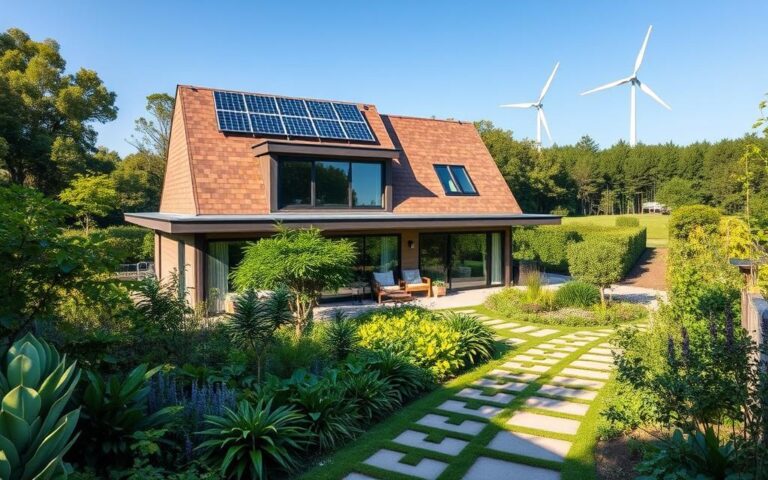In today’s world, saving energy is more important than ever. Effective energy-saving tips can help homeowners use less energy. This not only helps our planet but also saves money on utility bills. The U.S. Department of Energy says that energy-efficient practices can save households about $500 a year. In this article, we’ll look at the best ways to make your home more energy-efficient. These strategies promote a sustainable lifestyle and address important environmental challenges.

Understanding the Importance of Energy Conservation
Energy conservation is key in protecting our planet and boosting personal finances. It greatly affects greenhouse gas emissions from traditional energy sources. These emissions are a major cause of global warming.
We need to use practices that cut their harmful effects. The U.S. Environmental Protection Agency says saving energy reduces emissions. This helps keep the air cleaner. Implementing good energy-saving methods helps us all fight pollution and climate change.
Cutting down on energy use lowers our need for fossil fuels. This makes a country’s energy more stable. Using energy wisely is good for the environment. It also helps keep energy prices down and boosts the economy.
- Enhances air quality through reduced emissions.
- Decreases dependence on fossil fuels, promoting energy security.
- Encourages the development of renewable energy sources.
- Reduces energy bills, enhancing financial savings.
- Supports local economies through sustainable practices.
| Benefit | Description |
|---|---|
| Environmental Protection | Conserving energy mitigates climate change and preserves natural resources. |
| Financial Savings | Lower energy consumption translates to reduced utility costs for households and businesses. |
| Energy Security | Energy efficiency decreases reliance on imported fuels, enhancing national security. |
| Job Creation | The transition to energy-efficient technologies can lead to new job opportunities in green sectors. |
By adopting energy-saving techniques and green habits, we save money and build a stronger energy future for everyone.
Energy-Saving Tips for Homeowners
Homeowners can reduce energy consumption a lot by adopting useful habits. These energy-saving tips positively affect the environment and lower monthly bills.
- Turn off lights when they are not needed. This simple step can save a lot of energy.
- Use natural light during the day. Open curtains and blinds to use sunlight instead of artificial light.
- Set thermostats smartly. Keeping a comfy temperature at certain times can save on heating and cooling.
- Unplug devices when you’re not using them. Many gadgets use power even when off, so unplugging them avoids wasting energy.
- Check and replace air filters often. This keeps heating and cooling systems efficient, saving more energy.
Doing all these things can cut energy use by up to 25%. Homeowners can easily make these practices part of their daily life for the best effect.
| Energy-Saving Tips | Estimated Energy Savings (%) |
|---|---|
| Turning off unused lights | 5-10 |
| Using natural light | 10-15 |
| Adjusting thermostat settings | 10-20 |
| Unplugging devices | 5-10 |
| Replacing air filters regularly | 5 |
Investing in Energy-Efficient Appliances
Homeowners looking to cut their energy bills might think about getting energy-efficient appliances. These appliances, especially those with the ENERGY STAR label, use a lot less energy. They often use between 10% to 50% less than standard models. This can lead to big savings over the years.
Energy-efficient appliances might cost more at first. But, they save money in the long run. The U.S. Department of Energy says that upgrading old appliances can save families up to $600 over their lifetimes. Investing in these appliances is not just good for your wallet. It also helps our planet by using less energy.
To see the benefits of upgrading, look at this table comparing energy-efficient and standard appliances:
| Appliance Type | Energy Consumption (kWh/year) | Average Cost Savings ($/year) | Expected Lifespan (years) |
|---|---|---|---|
| ENERGY STAR Refrigerator | 400 | 80 | 15 |
| Standard Refrigerator | 800 | 0 | 15 |
| ENERGY STAR Washing Machine | 300 | 40 | 10 |
| Standard Washing Machine | 600 | 0 | 10 |
Choosing the right appliances lets homeowners lower their energy use and save money. Energy-efficient habits lead to cheaper bills. They also help ensure a greener future for everyone.
Optimizing Heating and Cooling Systems
Making your heating and cooling systems better helps save energy at home. It’s important to keep HVAC systems well-maintained. This includes changing filters and getting professional check-ups regularly.
Sealing your ductwork stops leaks and makes sure warm or cool air goes where it should. This step greatly improves comfort and saves energy.
Using programmable thermostats is another smart move. They let you control the temperature based on when you’re home. The U.S. Department of Energy says these steps can cut heating and cooling costs by 10-30%.
Here are some seasonal tips to save even more:
- In winter, set thermostats to 68°F when you’re up and lower it when sleeping.
- In summer, keep it at 78°F during the day if you’re home.
- Turn it down when you leave to save energy.
Following these tips lowers your bills and makes your home more comfy.
Sealing and Insulating Your Home
Sealing and insulating your home is key for saving energy. It means filling gaps around doors, windows, and more. This step cuts down on energy use. It keeps heat in during winter and out in the summer.
According to the U.S. Energy Information Administration, good insulation can lower energy bills by 15-20%. This shows how valuable it is to make your home more energy efficient.

- Windows and doors
- Attics and basements
- Electrical outlets
- Pipes and vents
To fully seal and insulate your home, focus on key areas. Improving energy efficiency makes your home cozier and cuts energy costs. It supports sustainable living and helps save money on bills.
| Area | Common Issues | Solutions |
|---|---|---|
| Windows | Drafts and leaks | Weatherstripping and caulking |
| Doors | Gap at the bottom | Door sweeps and thresholds |
| Attics | Unsealed openings | Insulation and sealant |
| Basements | Moisture and drafts | Insulation boards |
By using these sealing and insulating methods, you can greatly reduce energy use. It also boosts your comfort throughout the year.
Adopting Sustainable Energy Habits
Adopting sustainable energy habits can significantly cut your home’s energy use. Small everyday actions can result in big eco-friendly changes. These habits save resources and help make the planet healthier.
Effective strategies include:
- Unplugging appliances when they’re not in use stops wasted energy.
- Turning down your water heater saves energy while keeping you comfortable.
- Using power strips makes turning off multiple devices easy.
The National Renewable Energy Laboratory says these simple steps can hugely reduce energy use. Having a family plan for these habits gets everyone involved in saving energy.
Making these energy-saving tips fun increases commitment. Try setting weekly reminders or using a chart to track everyone’s progress.
| Energy Habit | Impact on Energy Consumption |
|---|---|
| Unplug devices | Reduces phantom load by up to 10% |
| Lower water heater temperature | Saves 3-5% on energy bills for every 10°F reduction |
| Use power strips | Promotes easier control of energy use across multiple devices |
Adopting these habits saves money and fosters a sustainable lifestyle for our future.
Utilizing Renewable Energy Sources
Exploring renewable energy sources is key for homeowners wanting to be more energy-efficient. Technologies like solar panels and wind turbines help cut down on traditional energy use. This makes energy habits more sustainable. Especially in sunny places, solar energy can lower electricity bills a lot. The U.S. Department of Energy says homeowners benefit greatly from switching.
Using renewable tech has its ups and downs. Homeowners may see lower bills and help the environment. But, they may face high upfront costs and need enough space. Knowing about incentives is important. Things like federal tax credits and local rebates can make costs easier to handle.
- Research local incentives for renewable energy installations.
- Consider solar panels for sunny areas to maximize energy generation.
- Explore wind turbine options if living in regions with consistent wind patterns.
Choosing renewable energy is good for both sustainable habits and home efficiency. When thinking over these options, balance the initial costs with the long-term gains. Make sure your choice is not only good financially but also for the planet.
| Renewable Energy Source | Benefits | Challenges |
|---|---|---|
| Solar Panels | Reduces electricity bills, minimal maintenance | High upfront cost, requires adequate sunlight |
| Wind Turbines | Generates significant energy in windy locations | Space requirement, noise concerns |
| Geothermal Systems | Efficient heating and cooling | Installation complexity, space needed |
Implementing Smart Home Technology
Smart home technology lets us manage energy better at home. This includes things like smart thermostats and automated lights. With these tools, you can set up your home to use less energy. They show you how much energy you’re using. This helps you make smarter choices to save energy.
Think about using a Nest Thermostat or Philips Hue bulbs. They can drop your energy use by 10-30%. You can program them to match your daily routine. This means they’ll turn off automatically when you don’t need them.
Here are some tips for adding smart tech to your home:
- Choose devices compatible with existing home systems.
- Utilize mobile apps for remote monitoring and control.
- Incorporate voice-activated assistants to simplify operations.
- Establish a centralized hub for seamless connectivity among devices.
Looking into smart home tech can lower your bills and help the planet. It’s a big step towards living more sustainably. Changing to energy-efficient ways makes a lasting difference in our homes.
Eco-Friendly Energy Tips for Everyday Living
Introducing eco-friendly energy tips into our days can save much energy. Each small step we take helps a lot for the environment and reduces house energy use. Simple changes bring big rewards.
Using reusable bags for shopping instead of single-use plastic ones is one smart move. It cuts down plastic waste and supports sustainability. When doing laundry, choosing cold water settings saves a lot of energy. It greatly reduces the energy for heating water.
Using the dishwasher less is a good way to conserve energy. Letting dishes air dry instead of using the dryer saves power. This method saves energy and helps your appliance last longer.
In our home offices, we should use natural light in the daytime. This cuts back on needing electric lights. Choosing LED bulbs for lighting saves energy because they use less power than old bulbs.
To give a better idea, here is a table that lists some eco-friendly energy tips and their benefits:
| Tip | Benefit |
|---|---|
| Use reusable bags | Reduces plastic waste and promotes sustainability |
| Cold water washing | Saves energy by minimizing heating costs |
| Minimize dishwasher use | Lower energy use and extend appliance life |
| Maximize natural light | Reduces reliance on electric lighting |
| Use LED bulbs | Consumes less energy, lasting longer than traditional bulbs |
By adding these eco-friendly energy tips to our daily routines, we can see real energy savings. This also helps protect the environment.
Top 5 Energy-Saving Techniques for Your Home
By using smart energy-saving methods, you can cut down on your home’s energy use. This means lower bills and less harm to the planet. Here’s a list of five important ways to save energy:
- Invest in Energy-Efficient Appliances: Choosing appliances with the ENERGY STAR label can slash your energy bills.
- Optimize HVAC Systems: Keeping your heating and cooling systems in check boosts their performance.
- Seal and Insulate: A well-insulated home keeps the warmth in and the cold out, saving you money.
- Adopt Sustainable Habits: Small acts, like switching off lights, can have a big impact over time.
- Utilize Smart Technologies: Devices like smart meters fine-tune energy use, cutting down on waste.
These methods work together to make a big dent in energy use. By adopting these tips, you can enjoy a cozy home and save on expenses.
Conclusion
Saving energy is crucial for homeowners and our planet alike. We’ve looked at many ways to be more efficient, like buying energy-saving appliances and being more eco-conscious. These steps help lower your carbon footprint and can also cut down your bills.
You can easily start making changes. Simple acts like sealing up drafts, tweaking your heating and cooling, and using renewable energy can have a big impact. Using smart home tech can also make things more efficient and easy to manage.
When we all do our part in saving energy, the positive effects are huge. By following these green tips, we make our homes better and help the planet too. Start now with small steps. You’ll see how they add up to big changes over time.
FAQ
What are some effective energy-saving tips for my home?
Turning off lights when not in use is a key tip. Use energy-efficient appliances too. Also, seal gaps in windows and doors to stop drafts.
Using natural light helps cut down on energy use. These steps make your home eco-friendlier.
How can I adopt sustainable energy habits in my daily routine?
Unplugging gadgets that are not in use is a good start. Setting your thermostat smartly helps. Also, turn down your water heater.
These simple acts save a lot of energy over time.
What are energy-efficient practices that lower my utility bills?
Buying ENERGY STAR rated appliances is smart. Optimize your heating and cooling. Insulate your home well.
These steps lower your utility bills by saving energy.
Why is energy conservation important for the environment?
It cuts down greenhouse gas emissions. It also reduces our need for fossil fuels. Saving energy makes for a cleaner world and fights climate change.
How much can I save by replacing old appliances with energy-efficient ones?
Switching to energy-efficient appliances saves about $600 over their life. These use 10-50% less energy. So, they’re a win for your wallet and the planet.
What are some energy-saving techniques for optimizing heating and cooling systems?
Regularly maintain your HVAC. Seal any leaks in ductwork. Use programmable thermostats wisely.
These steps help manage your home’s temperature efficiently.
How can I make my home more energy-efficient through insulation?
Proper insulation is crucial. Seal gaps and add insulation to keep warmth in during winter and out in summer. This could cut your energy bills by 15-20%.
What role does smart home technology play in energy management?
Smart thermostats and automated lighting save energy. Energy monitors help too. They can reduce energy use by 10-30%.
Adopting these technologies makes a big difference.
Are there any eco-friendly energy tips I can apply while working from home?
Use energy-saving lights and adjust your computer’s power settings. Cut back on printer use. Cold-water wash your work clothes to save energy.




